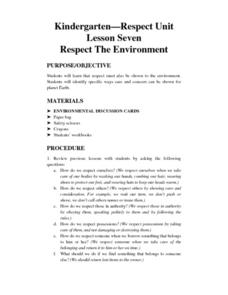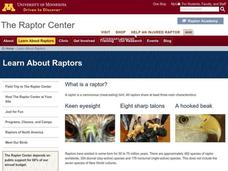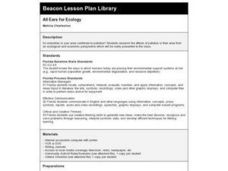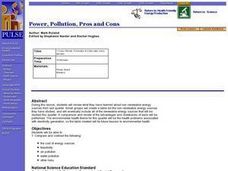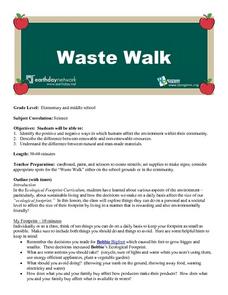Curated OER
"What If The Earth Were Made Of Sand
Students examine the most common characteristics of clay and sand, and to understand how the properties of these materials affect the erosion of the landscape and the formation of the many landforms. They explore clay and sand through...
Curated OER
Class Presentation on Coal
Did you know that coal was formed from plants? After being assigned a coal-related topic, groups gather, organize, and present information about this energy source. The presentations should include visuals like graphs, charts, tables,...
Curated OER
Kindergarten-Respect Unit (Lesson Seven) Respect The Environment
Students review the concept of respect and that they should respect, not only themselves, but those around them. They comment on some example pictures in which the environment is NOT being respected and decide what should have been done...
Curated OER
Protecting Philippine Reefs
Learners watch a slide show about the Philippine Reefs to explore the topic of fish populations. In this reef and fish population instructional activity, students watch a slide show about fish populations and how the Peace...
Curated OER
March of the Polar Bears: Global Change, Sea Ice, and Wildlife Migration
Students study global change and how these changes impact wildlife. In this polar bears lesson students analyze maps and data to understand climate change.
Curated OER
Adaptation Worksheet
Adaptation or acclimation? Young ecologists determine which is being exemplified in twenty questions. When teaching about adaptations, make sure to talk about acclimation, a short-term learned response to a change in the surroundings....
Curated OER
Moldy Jell-O
Mini mycologists plan an experiment to determine what affects the growth of mold on gelatin. A list of available materials is provided, but the procedure needs to be designed by the lab group. A data table is also provided in...
Curated OER
River Study
Students study physical features of a local stream. They study how to identify water features on topographic maps.
Curated OER
Wetland Wonders
Students describe the characteristics of wetlands. They demonstrate their understanding of the importance of wetlands to humans and wildlife and determine they are defined by the presence of water, and specialized soils.
Curated OER
Class Conservation Corps (CCC)
Students investigate how the loss of soil, a valuable natural resource, affects their lives through loss of productive land to grow food, loss of coastal land mass, and poor water quality from runoff. They design a project to keep soil...
Curated OER
All Ears for Ecology
Fourth graders research to see the effects that air pollution has on where they live. They explore improper dumping of waste run-off, air pollution, and water pollution.
Curated OER
Power, Pollution, Pros and Cons
High schoolers review what they know about non-renewable energy, compare and contrast advantages and drawbacks of each type, such as cost of energy sources, feasibility, air pollution, water pollution, and other risks, and create table...
Curated OER
African Elephant Overpopulation Problem
Young scholars investigate the problem of elephant overpopulation. They identify the components of the watering hole as found in Addo Elephant National Park. They also pretend to be part of the environment and act out the part in a class...
Curated OER
Creating Communities
Students design a community with minimal environmental impact. They rate each other's community's presentation using the "Planning and Zoning Commission Rating Scale".
Curated OER
Sodium Bentonite Swelling Index
Students research the effects of sodium bentonite being combined with water. They discuss the reasons why this chemical is used in landfills. They measure the swelling index of sodium bentonite clay.
Curated OER
Environment: Waste Walk
Students assess the positive and negative affects of humans on the environment. The lesson explores ways in which individuals and societies can reduce the negative impact on the environment. By taking a "waste walk" around their campus,...




